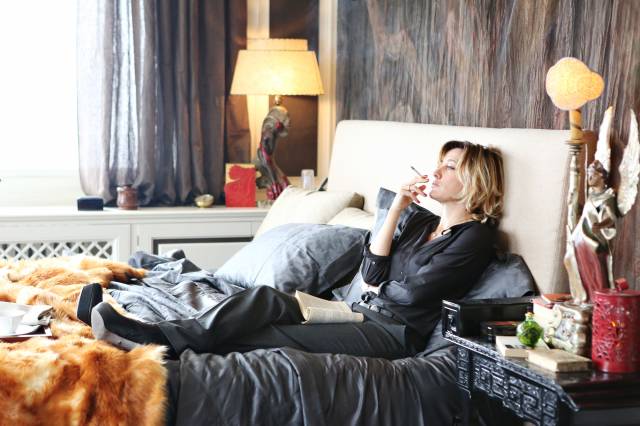
 Human Capital, Italy’s submission for the 2014 Best Foreign Language Film Oscar, cleverly examines the encroachment of capitalist economics into all other spheres of human activity. Yet the economics of the film are never presented in a dry, textbook manner, instead they’re lived realities that inform the actions of each character in this sleek thriller.
Human Capital, Italy’s submission for the 2014 Best Foreign Language Film Oscar, cleverly examines the encroachment of capitalist economics into all other spheres of human activity. Yet the economics of the film are never presented in a dry, textbook manner, instead they’re lived realities that inform the actions of each character in this sleek thriller.
Human Capital opens with an accidental death, when a biker is run off a dark, snowy road. This early death gives sinister overtones to the introduction of the main characters in the next, much cheerier scene, when Dino (Fabrizio Bentivoglio) drops off his daughter Serena (Matilde Gioli) at her wealthy boyfriend’s palatial villa. Dino ignores his daughter’s pleas to drop her off a few hundred yards away, instead getting out of the car to ingratiate himself with her boyfriend’s father, hedge fund mogul Giovanni (Fabrizio Gifuni). Dino is bumbling and oblivious, a middle class striver who sees Giovanni as his ticket to riches. Once Giovanni invites him to play tennis, he wastes no time in mortgaging his business to buy into Giovanni’s risky fund.
The film uses a multifaceted narrative approach, showing the same events from the perspectives of three different characters. This technique is growing in popularity and is used to great effect here, both parceling out facts to increase suspense of the overarching mystery and allowing the film to immerse us in three different worldviews to show us how something of vital importance to one person is peripheral to another.
After Dino, the film backs up to show the story of Carla (Valeria Bruni Tedeschi), Giovanni’s anxious and unfulfilled wife. Neither Giovanni, nor her brutish teenage son Massimiliano (Guglielmo Pinelli) seem to have much use for Carla any more and the former actress spends her days languishing away. When she sees a historic theater being shuttered, she senses a worthy project and solicits her husband for funds to save it. At first he’s only too happy (if condescending) to oblige, which allows Carla to find meaning in her days rehabbing the theater and having an affair with the artistic director, but when Giovanni’s fund takes a downward turn, he unthinkingly reneges on the promise, torpedoing Carla’s labor of love.
The final chapter centers on Dino’s daughter Serena. Despite what their parents think, Serena has already jettisoned the rich jerk Massimiliano in favor of a tormented artist. While the first two chapters focused on the economic stations of Dino and Carla, for Serena, these conditions haven’t quite solidified into inescapable realities and allow her to be an economic tourist, visiting different classes without staying for life. Serena’s chapter also wraps up the mystery of the biker’s death; the biker was struck by Massimiliano’s car, who claims he wasn’t driving but was too drunk to remember exactly.
The film benefits from strong performances all around, especially from Valeria Bruni Tedeschi and Matilde Gioli, who are compromised by wealth but retain enough distance to see it critically. The film’s class critique doesn’t introduce any new ideas, but it distinguishes itself by integrating the critique with the machinations of the plot. Director Paolo Virzi’s film is a stylishly shot and constructed thriller preoccupied with important questions of class and ethics.